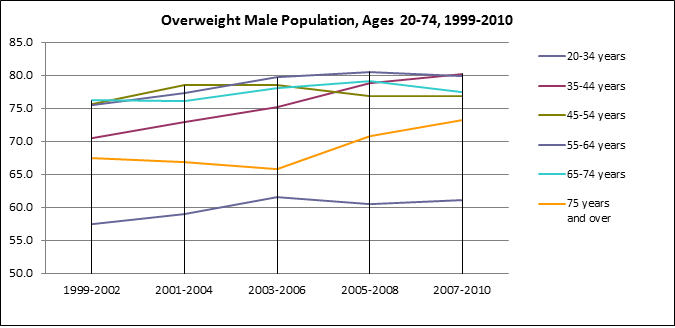The week leading up to Father’s Day, June 10-16, is National Men’s Health Awareness Week. It is a time to focus on getting and/or keeping yourself or the man in your life healthy. Weight-related diseases are a growing cause of men’s health issues.
What kinds of health problems are linked to excess weight?
· type 2 diabetes
· high blood pressure
· heart disease and strokes
· certain types of cancer
· sleep apnea
· osteoarthritis
· fatty liver disease
· kidney disease
The table and graph below illustrate the significant increase of overweight males in the 35-44 years category.
| Overweight(*BMI greater than or equal to 25.0)male adults 20-74 years, age-adjusted** | |||||
| United States, selected years 1999-2002 through 2007-2010 | 1999-2002 | 2001-2004 | 2003-2006 | 2005-2008 | 2007-2010 |
| 20-34 years | 57.4 | 59.0 | 61.6 | 60.5 | 61.1 |
| 35-44 years | 70.5 | 72.9 | 75.2 | 78.8 | 80.2 |
| 45-54 years | 75.7 | 78.5 | 78.5 | 76.8 | 76.8 |
| 55-64 years | 75.4 | 77.3 | 79.7 | 80.5 | 79.8 |
| 65-74 years | 76.2 | 76.1 | 78.0 | 79.1 | 77.5 |
| 75 years and over | 67.4 | 66.8 | 65.8 | 70.8 | 73.2 |


| *Body mass index (BMI) equals weight in kilograms divided by height in meters squared. |
| (Source CDC: Data are based on measured height, without shoes, and weight of a sample of the civilian non-institutionalized population.) |
| **Age-adjusted to the year 2000 standard population using five age groups:20-34 years, 35-44 years, 45-54 years, 55-64 years, and 65 years and over |
Closely linked to weight issues, is lack of physical activity. Recommendations from the CDC are as follows:
|
Recommended Scenarios |
Aerobic Activity |
Amount/Week |
|
Frequency/Week |
|
|
1 |
2 hours,30 minutes |
|
All major muscle groups |
2 or more days |
|
|
2 |
1 hour, 15 minutes |
|
All major muscle groups |
2 or more days |
|
|
3 |
Combined Intensity |
Up to 2 hours,30 minutes |
|
All major muscle groups |
2 or more days |
Proper nutrition also plays an important part in maintaining a healthy weight. Here are the guidelines for the average adult daily 2000 calorie intake:
· 6 ounces of whole grains,
· 2 and ½ cups of vegetables,
· 2 cups fruit,
· 3 cups low fat dairy, and
· 5 and ½ ounces of lean protein
With diligent efforts to keep active and eat properly any man can optimize his chances for good health.


